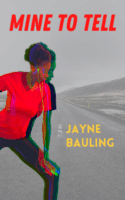At first, I want to refuse to see Fumani, but that would make me even more of a loser in Auntie’s eyes – and in my own.
Maybe he’s here to tell me that whatever was starting between us has to stop. I think he’s like that, not the sort to simply drop a girl with no explanation. Not that I’d need one.
Okay, I’ll respect his decision, and I will not – will not – cry. Or worse, run away. I’m an adult.
Yes, and adult life is turning out to be a whole lot more difficult than my childhood. Challenging, I correct myself. Difficult is one of those negative words, isn’t it?
But still a true word.
Fumani is sitting on the hardest chair in the room when I go through to see him. Gogo is on the couch, with a shawl pulled over her dressing-gown, and the two of them are looking at each other but not saying anything.
“Ritlatla.” Fumani jumps up when he sees me. He’s still wearing his tracksuit, same as I am.
“Shall we go outside?” No way am I having Gogo listening to whatever Fumani has to say.
“Sure.”
“What are you doing here?” I demand, when we’re outside the front of the house.
He lowers his mask and looks at the bench where my cousins and I used to sit and dream-scheme, when we were children full of plots and plans. The wood is so old and weather-worn, it’s a pale silvery colour.
We don’t sit down. I can’t tell exactly what Fumani’s mood is, but I’m too tense.
“Maybe you didn’t hear me back there when you took off like that.” His voice has a smile in it, but it’s also gentle. “I said we weren’t done yet.”
My heart is beating too hard, and my brain can’t work out what he means by that.
“Fumani–” I don’t know what to say.
“I’m sorry, Ritlatla,” he begins.
Here it comes. He’s going to back out of our beginning relationship. Probably in a nicer way than Mahlatse because he’s a better man than Mahlatse, but the end will be the same.
I haven’t brought a mask outside with me, so I try to make my face expressionless in the yellow light coming from the house.
“It’s fine,” I say, not wanting to hear any more.
“No, it’s not. I should have said something when Dzanga first started with her crap, but I was so … I don’t know–”
“Shocked,” I suggest. “Shocked to discover you’d been giving lifts to someone with HIV, and even holding hands with her.”
“God, no!” He’s offended. “Shocked by the way Dzanga and some of the others were carrying on; their attitude. Yes, I was a bit surprised to hear about you, but … well, it’s your business. I mean, early days, all that. We hadn’t got to the stage where you might have wanted to tell me.”
“I would have told you, I promise you, Fumani.” I need him to believe me. “If we’d … you know?”
“And Dzanga took it out of our hands.” His voice hardens. “She’s taken that away from us.”
“Not really, because I wasn’t going to let … um, things progress to the point where I needed to tell you,” I say.
“Why not?”
“Because I couldn’t bear for it to happen again.” I’m shaking. “When I told Mahlatse, he was scared. He literally ran out on me.”
“I’m not Mahlatse,” Fumani says, stepping forward and putting his arms round me.
Tell us what you think: What is responsible for the difference in Fumani’s and Mahlatse’s attitudes towards Ritlatla’s HIV status?


